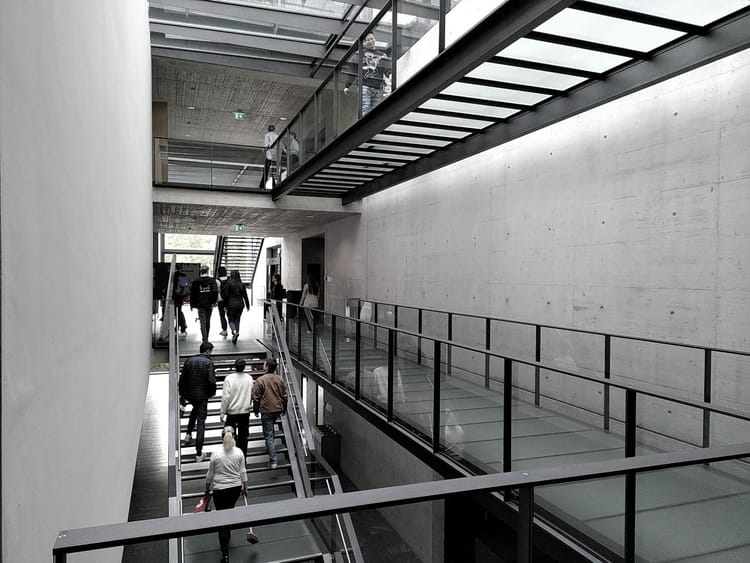A community platform for Open Data
Overall goals for *.opendata.ch as I understand them :
- Be the place to go to discover & participate in open data activities in Switzerland
- Catalogue available data sources, especially to highlight transparency & gaps in government
- Bring the data we are using, projects we are developing, people we are following, into one place
Some concrete problems we should address:
- Event registration
- lack of ability to follow up and connect participants with information and networking
- pretty much non-existent or roll-your-own overview/
measurement/analysis - a process that does not guide or inspire visitors, even problematic for some
- no clear notifications or status/location-update options
- constantly fail to update the event pages after an event (should be automatic)
- lots of scrolling, bad accessibility (low contrast), mobile unfriendly site
- just not representative of a cool, techy public event
- Discussions & social media
- conversations are sporadic and relatively short
- people wait for days to get answers to their questions, nobody “on duty”
- separate profile adds to the confusion around personal pages
- one long discussion forum makes it hard to find and manage topics
- if issues are discussed, the solutions are rarely documented
- @OpenDataCH is mostly a news channel, engaging irregularly with the audience
- #makeopendata and #opendatach not regularly Storifyfied or otherwise reused
- Resources & Documentation
- not very well organized, things are hard to find, ugly home page
- data sources and tools (key areas) are thrown together without much structure or explanation
- most of the really key information on Swiss open data (e.g. legal issues) not captured anywhere
- no channelling of resources for different audiences, beginners/advanced, developer/designer
- only external links, no integration with CKAN, no explanation – just not very helpful to people looking for data
- lots of passive outside, few “active” and internal links to resources and related wikis like OKFN
- few people are involved in maintaining and expanding the content, learning curve plus lack of motivation
- the wiki engine is not user friendly, not very scalable, tricky to administer
- not a foolproof setup – if people trample over content, likely that nobody will notice
- nobody checks regularly to see if updates or fixes are needed, not clear who “owns” it
- the mission of the wiki (to be a knowledge base for the community) is not defined
- Profiles
- just a basic wiki page, which only a handful of people have filled out
- need the ability to search people by skill or interest or project or activity
- should be possible to contact people/groups more easily, if they wish
- you should be able to see which hackathons a person has/will attend
- want to see where/what the community is, but we lack data for infographics
- few ways to personalize the page to make it more useful to you or your team
- would be nice to give people badges or other virtual rewards
- Projects
- if people do their knowledge base elsewhere, like GitHub, we don’t clarify what function a page on make serves
- the template does not do much to guide participants through the early stages of a project
- many teams don’t like the template at all and delete it, potentially losing some key info-fields
- impossible to tell how active / complete / what gaps a project has, the info is rarely shared
- can’t easily contact the project team, or leave a public comment or rating
- does not help to uphold the open source spirit of try it..like it..fork it
- dependencies and connections around data sources are not highlighted
- we don’t guide people enough towards good places to host, advertise their project
- project page design doesn’t look good, just fails to represent the productions well
- project directory is ugly and nearly useless
Ouch. OK, so enough with the self-criticism, how about some solutions… How can we turn all the negatives into positives, e.g. make the project directory beautiful and very useful?
- Event registration
- reconsider Eventbrite or Lanyrd or Attendly ..+ APIs to harvest data into our own app
- ..or research open source apps/modules for our needs
- ..or code our own (maybe techup.ch has ideas? a registration wizard is 1 weekend’s effort)
- make good metrics and follow-up tools requirements of whatever method we use
- design a event page that make sense in one screenful – and links! lots of them
- integrate with MailChimp or some other tool to keep track of mailings
- make sure that notifications and follow up emails work well and are fun to read, design the templates
- people should be able to let us know when they cancel or change location right on the site
- constantly fail to update the event pages after an event (should be automatic)
- add a calendar, on which we put in related events (other countries etc)
- put in place a high accessibility standard, develop a mobile web
- link to previous events, photos or impressions on the event page
- it should be interesting to visit the event page while the event is running
- put up Twitter wall, schedule, latest info up there continuously
- encourage people to share their registration over social networks
- “bring a friend” and other appeals to raise participation counts
- encourage people to host mini-events, share the format best practices
- have a check list for what needs to be published before/during/after events
- aim to get all visitors excited about the next hackathon
- Discussion forums/ social media
- look for other forum software if necessary, e.g. PhpBB, Movable Type
- ..consider simplifying our platform by using Google Groups in the cloud, or wiki pages on Confluence to hold discussions
- ..consider OSQA, but try not to exclude any non-developers who expect more traditional setup
- engage with each other and others on the forum, not closed mailing lists
- assign volunteers to the forum, rotate every week, set up alerts, etc.
- unify the profile so that clicking on a participant always lands on the same page
- come up with a structure for the community which is reflected in the wiki and forum
- really encourage people to capture bits of knowledge in the wiki
- create a form for Ideators to propose projects, potentially capturing lots of detail
- run bi-weekly events, such as polls, organize calls to action, like assisting a project
- run a few more Twitter accounts, like @OpenDataActivistCH @OpenDataDevCH with less news, more response
- Storify #makeopendata and #opendatach after events, keep them alive in between
- aggregate blogs based on tags from known Swiss open data bloggers
- run a forum thread for each opendata.ch blog post to discuss with the community
- consider podcasts and other avenues to spreading the word, recruit helpers on forums
- if we’re going to be cool and use IRC, let’s use it, if not, then let’s stop suggesting it
- Resources/ documentation
- I don’t see an easier way of collaborating with our community on high quality resources than a carefully managed wiki
- let’s consider more professional wiki software, i.e. Confluence with open source license, and migrate from Doku
- reorganize the content, brainstorm key areas, move stuff around until it makes sense, improve sitemap and search
- this does not take much time and should be an ongoing process, just like moderation or support
- get some inspiration from wikis at CKAN http://wiki.ckan.org and Rennselaer http://data-gov.tw.
rpi.edu/wiki - consider joining forces with another OKFN chapter, and conversely, splitting off responsibility for different areas
- CH data sources and tools (key areas) should get the most attention as they are what most people will come for
- use CKAN’s APIs as the source, wrap each data set with discussion and documentation
- focus on capturing some missing information on Swiss open data (e.g. legal issues), create a longer term plan
- involve people who enjoy doing this kind of thing like journalists and bloggers
- highlight resources for different audiences with beginners/advanced, developer/designer sections
- tutorials to get people started at hackathons or on their own would be really beneficial
- add more “active” links (feeds, deeper links, explanations) to resources and related wikis like OKFN
- make sure the new wiki scales well, is easy to administer and upgrade, and works fast
- keep an eye on new updates through the Dashboard – have a few people sign up to the firehose
- define the mission of the wiki (to be a knowledge base for the community, …)
- Project pages
- this is a key area of improvement and needs development work in my opinion
- the project page is a record of the steps taken, a meeting place slash braindump for the team, an ideal place to discover new and upcoming Swiss open data projects
- continue to encourage everyone to have a GitHub page or equivalent, which could be drafted on the wiki
- aim to have a beautiful directory like ohloh (could also be leveraged?)
- continue to encourage this as the first thing people create at a hackathon
- serve both as the scrapbook of notes and public face of project, perhaps with subpages for bigger projects, or projects grouped by theme (e.g. Transport API)
- a really important element of the project pages is super simple project management – there is little time to waste at hackathons
- however, after the hackathon projects tend to shut up and die – use the GitHub org, or a project management tool like Redmine to keep them bubbling longer
- make sure the template does more to guide participants through the early stages of a project
- for instance, include steps in a recommended project plan, make it more interactive, etc.
- get feedback from the community on how the project page should look like
- active / complete / gaps data would be useful, as would other metas
- it should be possible to contact the project team in one place, they opt-out individually
- leave public comments and ratings (likes, etc.) on each project page
- project resources should be forkable and all projects remixable
- review our stance on GitHub, how we promote and leverage it, use widgets and APIs
- more practical information on the wiki for project teams: where to host, etc.
- highlight dependencies and connections on open data sources
- rethink the page design to make it attractive – perhaps separate area for live/star projects
- turn the project directory into a gallery and search engine
- very important that if people are looking to ‘use’ open data, that they are guided to live apps where possible, a suggestion box where not
- post news about what’s happening on projects and themes onto the blog/list/forum
- Participant profile
- I still think this is useful and may warrant a bit of custom development
- ..one option would be to encourage everyone to have a GitHub or CKAN account
- ..or Drupal and WordPress have excellent social modules to make this easy
- we don’t need to replace the functionality offered by other personal profiles, e.g. Twitter
- but we should capture and display all the things we want to know about our participants (like we kind of did for Bern’s registration)
- of course as long as participants want to us to know and share
- give people badges to represent their involvement in the community, special roles, etc.
- registering or checking into a hackathon should leave a mark on the profile, so you can see who’s been where
- make sure you can search and filter people by skill or interest or project or activity
- add optional contact forms to be shown on the profile
- use profile data to create a map and charts about participants
- this is also a bit of motivation to complete the profile and put yourself on the map
- personalizing the page with widgets like my projects, latest activity, embedding, will make profiles more useful and interesting
Proposed Architecture for make.opendata.ch 2.0
(made with creately)
I agree that the current make. subdomain ought to be completely refactored, and suggest:
- get a polished, up-to-date, secure CKAN instance on ckan.opendata.ch – seed it well, seed it deep, get a working group together to reach out and educate data owners as at least Antoine and I have been doing
- archive the DokuWiki and move the content to a Confluence (Java/cloud based)wiki.opendata.ch – create the roots of a valuable knowledge base empowering our community
- move the Vanilla-powered discussions to Confluence – engage with our participants, stop worrying so much about the “right” message – just communicate and share knowledge
- organise an effort to brainstorm and develop a better project template/gallery – close links into CKAN, GitHub, EU data portal, datahub.io, etc. across the site
- stop editing HTML by hand like it’s 1999 and use a CMS like Semantic Drupal (demo) or extend the WordPress we use for the blog to include event information pages, sign-on, registration, private/public profiles on make.opendata.ch – note that there are a good cloud services, but I think running an open source CMS with the ability to develop our own plugins is a key element to work towards the open data platform 3.0 where everything becomes more closely integrated and accessible
- commit to openness: publish what we are doing, be meta about the project, practice what we preach
Completely open to discussion.
A point of reference
The EU PSI Portal runs along similar lines – their setup since 2010 is:
- data registry in CKAN
- Drupal CMS for the frontend for events etc.
- SOLR search engine
- Talis linked data (semantic web) store and service
- Blogs as articles copied into Drupal
- Used to run wikis (MediaWiki, I think), but closed them – now there is only ‘curated’ information
- They used to run forums, now just mailing list + contact form + Twitter
Random questions
- Has anyone received interesting lessons from people who’ve “been there, done that” in launching unofficial open data portals around the world? I want to talk to datadotgc.ca and there are many many others – we should look at what they’re doing and avoid reinventing the wheel.
- How centralized do we really want to run all this infrastructure? The issue of translation, maintenance, focus will continue to be somewhat of a drag factor. I think it would make no sense to split into French and German sub-sites, but what if? Should I stop writing anything in English, muddying the situation even more?
- What happened to Microsoft and their Open Gov Data Initiative? Is anyone using Azure?







 The works on this blog are licensed under a Creative Commons Attribution 4.0 International License
The works on this blog are licensed under a Creative Commons Attribution 4.0 International License